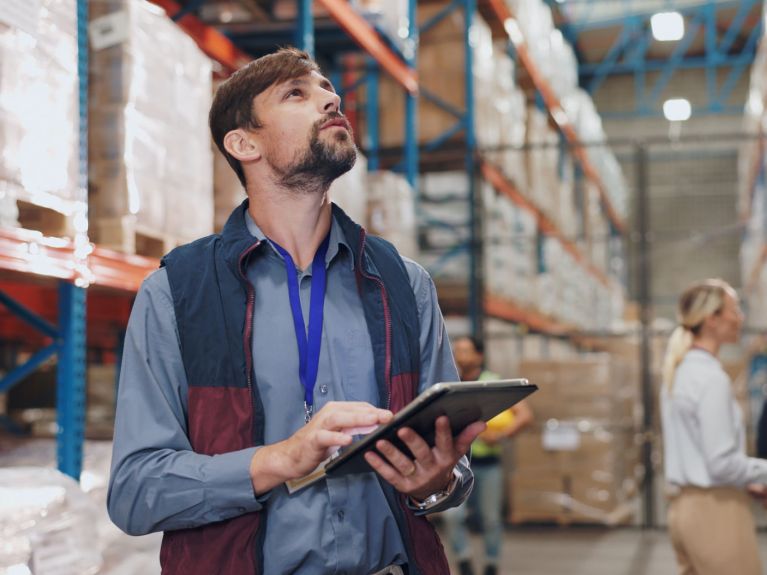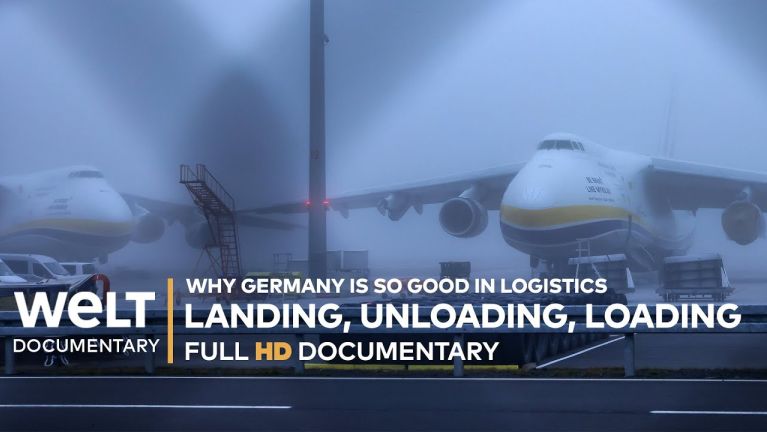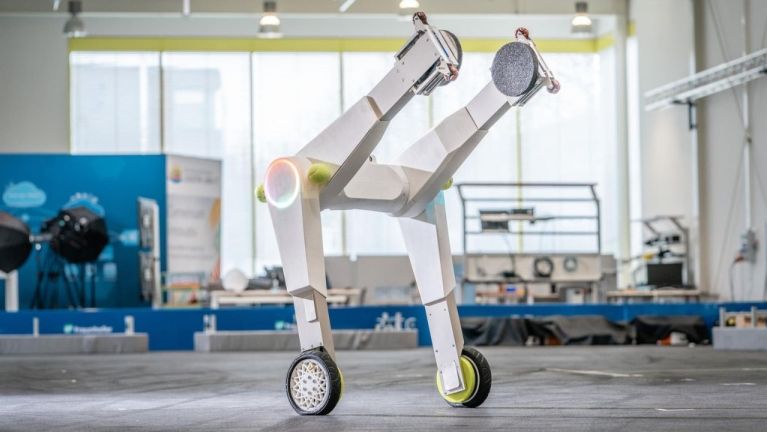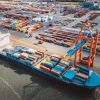Logistics - made in Germany
Efficiently controlling flows of goods is by no means child’s play. German logistics firms are highly regarded worldwide - and are constantly evolving.

Is the logistics of the future being made in Germany? One good example can be found in Öhringen near Heilbronn. A glance inside the warehouse that the company Dachser has built for its industrial and consumer goods logistics operations reveals a hive of activity: floor conveyors and other vehicles such as forklift trucks, pallet jacks and tractor units whizz around the warehouse, constantly ferrying packages from the loading ramps to the storage area and back. What the onlooker can’t see is the artificial intelligence (AI) that controls everything: hundreds of cameras on the ceiling automatically track parcels, vehicles and processes.
This results in a digital twin of the warehouse that shows the precise locations of packages and vehicles in real time. Meaning it is no longer necessary to scan barcodes by hand. Workers can see directly on screens where they should drop off the unloaded goods. Among other things, this live transparency accelerates the unloading of trucks by a third and makes better use of the space inside the warehouse. The team can focus on unloading and putting together shipments rather than hunting for parcels in warehouses that are often as big as a football pitch.
Last but not least, AI helps ensure that trailers and local transport vehicles are loaded in a way that makes best use of the available space. @ILO (Advanced Indoor Localization and Operations) is the method that Dachser has developed in cooperation with the Fraunhofer Institute for Material Flow and Logistics IML. The joint project encompasses all the key aspects that define high-tech logistics in Germany: digital technology, automated processes and cooperation with research institutions.
One of Germany’s biggest industries
Germany is an integral part of the global trade network and relies on highly efficient logistics: 4.3 billion tonnes of goods were transported in 2023 - the lion’s share by road. Not even a fifth of the volume was transported by rail - a greener alternative - while less than half of this amount in turn was shipped on inland waterways. Expensive or urgent goods are often flown to their destinations, while oil and gas are transported by pipeline. In addition, there is maritime transport: via Germany’s ports in Hamburg, Bremerhaven or Wilhelmshaven, cargo ships transport vast numbers of containers on global shipping routes. The Port of Hamburg is an important international hub, especially for trade with Asia and North America.
One of Germany’s biggest industries, the logistics sector is complex and extensive. Employing nearly three and a half million people, the sector chalked up sales of 327 billion euros in Germany in 2023. Household names such as Deutsche Post DHL, DB Schenker, Dachser and Hermes are world leaders. Overall, however, the industry is dominated by small and medium-sized enterprises (SME): nearly half of the 70,000 freight forwarders and logistics firms in Germany have at most 50 employees.
Logistics – an innovative sector

German companies have built up an outstanding reputation in a highly competitive global market. “Logistics firms from Germany are highly regarded around the world,” confirms Professor Christian Kille from the Technical University of Applied Sciences Würzburg-Schweinfurt. This is not without good reason: “They have mastered the processes and are very innovative,” explains the scientist.
Despite the crises of recent years, many companies that previously focused solely on transport and its planning have managed to evolve and now offer their customers a whole range of services that have nothing to do with conventional logistics. For example, they perform assembly tasks for the automotive industry or handle returns for electronics or fashion firms. In addition, they offer solutions, services and software in the form of “logistics as a service” (LaaS): cloud platforms, online marketplaces and digital cargo exchanges are a quick and straightforward way of bringing industry and trade together with logistics companies and freight forwarders. This heterogeneous sector also includes solely digital, platform- and data-based freight forwarding companies. Sennder, a “digital freight forwarder” that was established in 2015, has sales of over a billion euros.
Dieses YouTube-Video kann in einem neuen Tab abgespielt werden
YouTube öffnenThird party content
We use YouTube to embed content that may collect data about your activity. Please review the details and accept the service to see this content.
Open consent formGet robots into production!
In view of the tough global competition, German industrial and trading companies have also further lowered the costs of logistics. At the same time, they have succeeded in increasing their productivity by automating and digitising their logistics. This was noted in March 2025 by the “Logistikweisen” - a panel of experts that regularly assesses the industry.
Transport robots shuttle between warehouses and assembly lines in industrial production facilities. The automotive industry is particularly advanced: new technical standards ensure that entire fleets of mobile robots, from many different manufacturers, can be controlled by software. Many processes are also automated in the trade sector. In the gigantic distribution centres operated by e-commerce firms, thousands of robots prepare millions of parcels for shipment, supported by state-of-the-art sorting machines.
Increasingly, humanoid robots that look like something out of a science fiction film are also being deployed in logistics: the EvoBot developed by the Dortmund-based Fraunhofer IML for instance can push, pull and carry - and moves around on two (wheeled) legs.
Dieses YouTube-Video kann in einem neuen Tab abgespielt werden
YouTube öffnenThird party content
We use YouTube to embed content that may collect data about your activity. Please review the details and accept the service to see this content.
Open consent formA passion for solutions
Despite all this automation, however, logistics remains a sector with a high degree of human involvement. Insiders say that’s exactly what makes the industry so exciting: all kinds of different fields of activity that always have to keep an eye on global, national or local trends.
Be it in response to geopolitical crises, climate change or technological advances, supply chains keep having to be adapted and realigned. When ships get stuck in the Suez Canal, raw materials are no longer available because of a conflict, or if demand suddenly increases, it is logistics experts who have to step up and find a solution.




